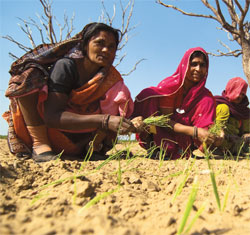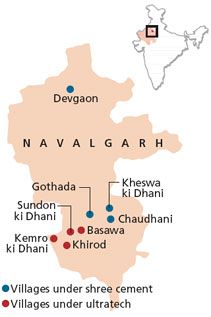Article and Image courtesy: Down To Earth
Author: Ankur Paliwal
Farmers from 12 Rajasthan villages refuse to part with fertile land for cement companies.
 The government says the land is of little agricultural use
The government says the land is of little agricultural use
Photo: Sayantoni Palchoudhuri
It’s been more than seven months. Farmer representatives from 12 villages in Nawalgarh are on a sit-in protest outside the sub-divisional magistrate’s office. Their demand: do not give our fertile land to industry.
Three cement giants are eyeing this limestone-rich area in Jhunjhunu district of Rajasthan. Limestone is the prime ingredient for cement production. In 2007, the state government notified 5,769 hectares (ha) for their plants and ancillary mines, saying the area is of “little agricultural importance”. It granted over 4,600 ha to Ultratech Cement of Aditya Birla Group, 780 ha to Shree Cement of Rajasthan and 825 ha to India Cements of Chennai. Rajpal Singh, sub-divisional magistrate of Nawalgarh, says 90 per cent of the notified area is private-owned and about 15,000 farmers stand to lose their land.
The protest started in November last year when farmers in four villages received notices, which said the government is acquiring their land for, cement plants. Landowners can collect the compensation amount—Rs 18 lakh for a ha of irrigated land and Rs 17 lakh for a ha of unirrigated or rain-fed land—from the district administration’s office, it noted.
 The acquisition was for Shree Cement, which had requested the Rajasthan State Industrial Development and Investment Corporation (RIICO) to acquire land for its plant. The company is buying land directly from farmers for its mine. Around the same time, officials of Ultratech also negotiated with farmers in four other villages to buy land for the integrated cement plant (see map).
The acquisition was for Shree Cement, which had requested the Rajasthan State Industrial Development and Investment Corporation (RIICO) to acquire land for its plant. The company is buying land directly from farmers for its mine. Around the same time, officials of Ultratech also negotiated with farmers in four other villages to buy land for the integrated cement plant (see map).
India Cements is yet to start work on its project.
The government did not consult us before deciding to give our land to the industry, says Vinod Kumar of Gothada village, where Shree Cement is setting up its plant. He refuses to part with his 100 bigha farm (9 bigha=1 ha) no matter what the compensation is. It is the only source of living for his family of six. Kumar continues to grow wheat, groundnut, onion, mustard and pearl millet on his land, and, on lean days, goes to the tehsil headquarters to join the farmers, staging sit-in protest.
Government officials say they held public hearings in February 2009 before acquiring land for Shree Cement. Kumar and other residents of Gothada say they were not informed. The hearing was conducted in a hurried manner in the presence of very few farmers.